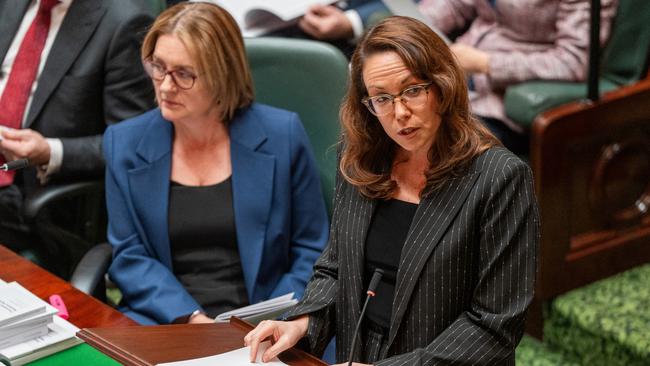State budget: Victoria’s debt on track to soar to a record $200bn, as tax take up $10bn
Victoria’s debt will soar to a new record and the state will rake in an extra $10bn from existing taxes. Here are the key takeaways of Treasurer Jaclyn Symes’ first budget.

Victoria
Don't miss out on the headlines from Victoria. Followed categories will be added to My News.
Victoria’s state debt is on track to soar to a record $200bn — or $71,000 per household — amid huge question marks over the budget’s forecasts for investment in education, health, justice, energy, jobs and transport.
Official forecasts released on Tuesday predict net debt will continue to rise to $194bn by 2028-29 with an attached interest bill of $10.6bn — or $28.9m dollars a day.
Following the same trajectory — which sees debt as a percentage of state gross product hover around 25 per cent over the forward estimates — Victoria would owe a staggering $200bn by 2029-2030.
The tax take will also increase from $31bn in 2022-2023 to $41bn in 2025-26, a whopping $10bn or 30 per cent despite the introduction of no new taxes in the budget.
Pending a review of the public sector workforce and the promise to axe thousands of jobs, the government’s wages bill was $449m higher than anticipated for this financial year and is predicted to climb to $42.4bn over the forward estimates.
At the same time the government has flagged stalling or reducing funding to key portfolio areas that government sources said would lead to critical service delivery issues.
It includes reducing education spending by almost $200m between 2025-26 and 2028-29, and investment in transport down from $9.4bn to $8.9bn.
Health spending will grow just less than $1bn over those same four years, while spending will slow across energy, justice and jobs portfolios.
The planned cuts come despite government spending blowing out by more than 14 per cent across all portfolio areas last financial year including a $3.3bn blowout in infrastructure spending.
Victoria has been firmly put on notice that it faces a devastating credit downgrade from its current AA rating, the lowest in the nation, which would ultimately increase borrowing costs.
S&P Global Ratings analyst, Rebecca Hrvatin, warned Victoria’s rating would face downgrade pressure without a degree of fiscal discipline in the budget.
“Fiscal discipline will be key to maintaining the ratings and containing costs of the state’s large infrastructure program,” she said.
“What we will be looking for in the next budget is the state’s commitment to controlling operating costs and stabilising debt levels.
“We view Victoria’s commitment to controlling operating costs, making cost savings, and slowing growth in debt as important.”
Treasurer Jaclyn Symes said she would fly to New York next month to meet with ratings agencies to discuss the state’s credit rating.
She spruiked the return to an operating surplus of $600m, down $1bn on earlier forecasts, and said Victoria was on track to begin reducing debt she blamed on investment in productive infrastructure, and the Covid pandemic.
“If we didn’t spend that money people would have died and businesses would have gone under. That’s why we’ve got the numbers we’re talking about.
“If you can grow your economy we can continue to make sure we are paying the bills, per se, when it comes to our debt.
“I will be sure that we’re on track for that. The stronger our economy is the more easy it is to service any of the responsibilities we have.”
The government reported a $3.4bn deficit for 2024-25.
Overall government spending is expected to reach $107.7bn in 2026-27 and increase by an average 2.3 per cent over the forwards.
The budget included a record $31bn investment in health, $727m for the Metro Tunnel, $976m for regional roads and $318m for a children’ free public transport scheme.
A further 727m will go to expanding the state’s prison network.
The government will scale back infrastructure investment over the next four years, from a peak of $24bn to $15.6bn by 2028-29, a year later than planned.




